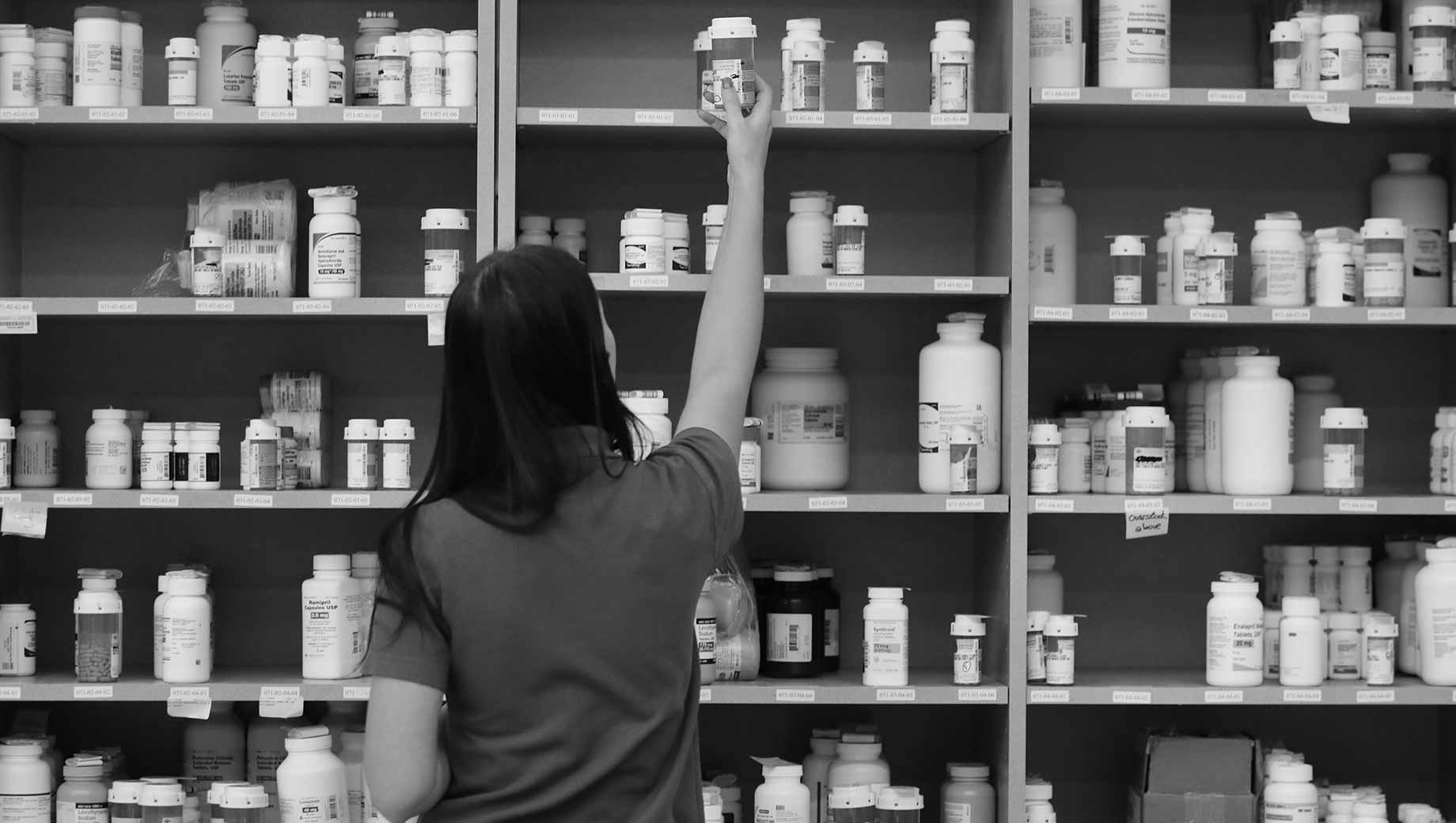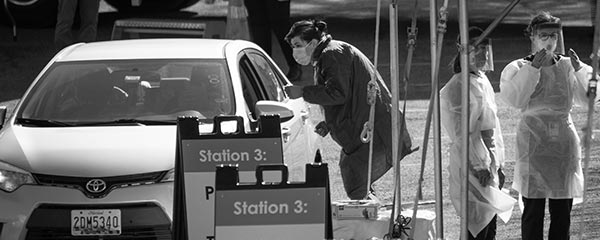Story Highlights
- Perceived increases in cost of drugs cross socioeconomic lines
- Little progress seen in addressing rising drug costs
- 75% support Senate vote on House legislation HR 3
This is the second article in a two-part series, conducted in partnership with West Health, a family of nonprofit and nonpartisan organizations focused on lowering healthcare costs for seniors, on the rising costs of healthcare in the U.S. The first article explores the relationship between the spread of COVID-19 and avoiding care due to costs or fear of infection.
WASHINGTON, D.C. -- Two-thirds of U.S. adults (66%) report that prescription drug prices have increased either a little or a lot since 2017, the first year of the Trump administration. Self-identified Democrats (81%) and independents (70%) are more likely to perceive an increase in prices than are Republicans (47%), although less than 10% among all three groups see a decline in drug prices during this period. These results are part of a special study by Gallup and West Health to assess public opinion on the cost of healthcare in the U.S.
| U.S. adults | Republicans | Independents | Democrats | ||||||||||||||||||||||||||||||||||||||||||||||||||||||||||||||||||||||||||||||||||||||||||||||||
|---|---|---|---|---|---|---|---|---|---|---|---|---|---|---|---|---|---|---|---|---|---|---|---|---|---|---|---|---|---|---|---|---|---|---|---|---|---|---|---|---|---|---|---|---|---|---|---|---|---|---|---|---|---|---|---|---|---|---|---|---|---|---|---|---|---|---|---|---|---|---|---|---|---|---|---|---|---|---|---|---|---|---|---|---|---|---|---|---|---|---|---|---|---|---|---|---|---|---|---|
| % | % | % | % | ||||||||||||||||||||||||||||||||||||||||||||||||||||||||||||||||||||||||||||||||||||||||||||||||
| Increased a lot | 35 | 22 | 37 | 45 | |||||||||||||||||||||||||||||||||||||||||||||||||||||||||||||||||||||||||||||||||||||||||||||||
| Increased a little | 31 | 24 | 33 | 36 | |||||||||||||||||||||||||||||||||||||||||||||||||||||||||||||||||||||||||||||||||||||||||||||||
| TOTAL INCREASED | 66 | 47 | 70 | 81 | |||||||||||||||||||||||||||||||||||||||||||||||||||||||||||||||||||||||||||||||||||||||||||||||
| Remained the same | 25 | 42 | 20 | 13 | |||||||||||||||||||||||||||||||||||||||||||||||||||||||||||||||||||||||||||||||||||||||||||||||
| Decreased a little | 6 | 7 | 7 | 2 | |||||||||||||||||||||||||||||||||||||||||||||||||||||||||||||||||||||||||||||||||||||||||||||||
| Decreased a lot | 1 | 1 | 1 | 1 | |||||||||||||||||||||||||||||||||||||||||||||||||||||||||||||||||||||||||||||||||||||||||||||||
| TOTAL DECREASED | 7 | 8 | 8 | 3 | |||||||||||||||||||||||||||||||||||||||||||||||||||||||||||||||||||||||||||||||||||||||||||||||
| Figures are rounded to the nearest whole percentage. | |||||||||||||||||||||||||||||||||||||||||||||||||||||||||||||||||||||||||||||||||||||||||||||||||||
| Gallup-West Health Healthcare Costs Survey, Feb. 17-28, 2020 | |||||||||||||||||||||||||||||||||||||||||||||||||||||||||||||||||||||||||||||||||||||||||||||||||||
These data are based on interviews with 1,020 U.S. adults across all 50 states and the District of Columbia, conducted Feb. 17-28, 2020. The belief that drug costs have increased is highly consistent across demographic subgroups, with little differences found based on race/ethnicity, gender, education level, annual household income and age.
Dovetailing with these results are perceptions of Trump's progress in controlling rising drug costs, with 31% of Americans saying the Trump administration has made "a great deal" or "a fair amount" of progress, compared with 65% who report "not very much" progress or "none at all." These results are slightly more positive for the president than in September 2019, when 27% perceived a great deal or fair amount of progress. The four-percentage-point increase is statistically significant.
| A great deal | A fair amount | Not very much | None at all | ||||||||||||||||||||||||||||||||||||||||||||||||||||||||||||||||||||||||||||||||||||||||||||||||
|---|---|---|---|---|---|---|---|---|---|---|---|---|---|---|---|---|---|---|---|---|---|---|---|---|---|---|---|---|---|---|---|---|---|---|---|---|---|---|---|---|---|---|---|---|---|---|---|---|---|---|---|---|---|---|---|---|---|---|---|---|---|---|---|---|---|---|---|---|---|---|---|---|---|---|---|---|---|---|---|---|---|---|---|---|---|---|---|---|---|---|---|---|---|---|---|---|---|---|---|
| % | % | % | % | ||||||||||||||||||||||||||||||||||||||||||||||||||||||||||||||||||||||||||||||||||||||||||||||||
| Feb 17-28, 2020 | 7 | 24 | 36 | 29 | |||||||||||||||||||||||||||||||||||||||||||||||||||||||||||||||||||||||||||||||||||||||||||||||
| Sep 16-30, 2019 | 7 | 20 | 33 | 33 | |||||||||||||||||||||||||||||||||||||||||||||||||||||||||||||||||||||||||||||||||||||||||||||||
| Gallup-West Health Healthcare Costs Survey | |||||||||||||||||||||||||||||||||||||||||||||||||||||||||||||||||||||||||||||||||||||||||||||||||||
As in September, partisanship influences these perspectives -- with over half of Republicans (56%) perceiving a great deal or fair amount of progress and 38% seeing not very much or none at all. Among Democrats, these figures are 8% and 90%, respectively.
The slight improvement in those seeing at least a fair amount of progress, however, is driven not by Republicans, but instead by independents (up six points, to 28%) and Democrats (up five points). Perceived progress among Republicans -- the party of the president -- is down seven points, from 63% in September.
Three in 10 Prioritize Drug Costs as 2020 Election Issue
Against the backdrop of perceptions of rising drug prices and minimal progress made in curtailing them, nearly one-third of U.S. adults (30%) consider a candidate's position on lowering drug costs to be "the single most important issue" or "among the most important issues" in influencing their vote in the 2020 election.
Women place somewhat higher importance on the price of prescription drugs than do men, while nonwhites (45%) are twice as likely as whites (23%) to do so. Annual household income is strongly inversely related to importance to voting, with 45% of those from households making less than $40,000 rating the drug price issue as highly important, compared with 14% of those from households making $100,000 or more.
These perspectives are also heavily influenced by political identity. While Democrats are three times as likely to rate the issue as important (45%) rather than unimportant (15%) to their vote, this is reversed among Republicans (12% important vs. 41% unimportant). A third of independents (34%) place high importance on this issue, while 19% place low importance on it.
| Most important/Among the most important | Least important/Among the least important | |||||||||||||||||||||||||||||||||||||||||||||||||||||||||||||||||||||||||||||||||||||||||||||||||||
|---|---|---|---|---|---|---|---|---|---|---|---|---|---|---|---|---|---|---|---|---|---|---|---|---|---|---|---|---|---|---|---|---|---|---|---|---|---|---|---|---|---|---|---|---|---|---|---|---|---|---|---|---|---|---|---|---|---|---|---|---|---|---|---|---|---|---|---|---|---|---|---|---|---|---|---|---|---|---|---|---|---|---|---|---|---|---|---|---|---|---|---|---|---|---|---|---|---|---|---|---|
| % | % | |||||||||||||||||||||||||||||||||||||||||||||||||||||||||||||||||||||||||||||||||||||||||||||||||||
| U.S. adults | 30 | 25 | ||||||||||||||||||||||||||||||||||||||||||||||||||||||||||||||||||||||||||||||||||||||||||||||||||
| Gender | ||||||||||||||||||||||||||||||||||||||||||||||||||||||||||||||||||||||||||||||||||||||||||||||||||||
| Women | 33 | 20 | ||||||||||||||||||||||||||||||||||||||||||||||||||||||||||||||||||||||||||||||||||||||||||||||||||
| Men | 28 | 30 | ||||||||||||||||||||||||||||||||||||||||||||||||||||||||||||||||||||||||||||||||||||||||||||||||||
| Race/Ethnicity | ||||||||||||||||||||||||||||||||||||||||||||||||||||||||||||||||||||||||||||||||||||||||||||||||||||
| Whites | 23 | 27 | ||||||||||||||||||||||||||||||||||||||||||||||||||||||||||||||||||||||||||||||||||||||||||||||||||
| Nonwhites | 45 | 18 | ||||||||||||||||||||||||||||||||||||||||||||||||||||||||||||||||||||||||||||||||||||||||||||||||||
| Annual household income | ||||||||||||||||||||||||||||||||||||||||||||||||||||||||||||||||||||||||||||||||||||||||||||||||||||
| <$40,000 | 45 | 17 | ||||||||||||||||||||||||||||||||||||||||||||||||||||||||||||||||||||||||||||||||||||||||||||||||||
| $40,000-<$100,000 | 31 | 23 | ||||||||||||||||||||||||||||||||||||||||||||||||||||||||||||||||||||||||||||||||||||||||||||||||||
| $100,000+ | 14 | 36 | ||||||||||||||||||||||||||||||||||||||||||||||||||||||||||||||||||||||||||||||||||||||||||||||||||
| Party ID | ||||||||||||||||||||||||||||||||||||||||||||||||||||||||||||||||||||||||||||||||||||||||||||||||||||
| Democrats | 45 | 15 | ||||||||||||||||||||||||||||||||||||||||||||||||||||||||||||||||||||||||||||||||||||||||||||||||||
| Independents | 34 | 19 | ||||||||||||||||||||||||||||||||||||||||||||||||||||||||||||||||||||||||||||||||||||||||||||||||||
| Republicans | 12 | 41 | ||||||||||||||||||||||||||||||||||||||||||||||||||||||||||||||||||||||||||||||||||||||||||||||||||
| Gallup-West Health Healthcare Costs Survey, Feb. 17-28, 2020 | ||||||||||||||||||||||||||||||||||||||||||||||||||||||||||||||||||||||||||||||||||||||||||||||||||||
Three-Fourths Support Vote on House Bill Meant to Lower Drug Prices
One proposal for addressing the rising costs of prescription drugs is through House bill HR 3, which passed the House in a largely partisan vote on Dec. 12, 2019. The legislation, also known as the Elijah E. Cummings Lower Drug Costs Now Act, requires the Department of Health and Human Services (HHS) to negotiate with drug manufacturers to set maximum prices for certain prescription drugs -- initially including insulin products and at least 25 single-source, brand-name drugs that are not available as generic drugs and that are among either the 125 drugs that account for the greatest national spending or the 125 drugs that account for the greatest spending under the Medicare prescription drug benefit and Medicare Advantage.
Most Democratic lawmakers support the bill as a means of bringing the large-scale negotiating power of the federal government and those whom it insures to bear in managing drug costs. President Trump, most Republican lawmakers and the pharmaceutical industry trade group PhRMA oppose the bill, noting that government intervention in the pharmaceutical industry could potentially curtail innovation and the pursuit of new drugs.
Currently, there is no indication that Senate Majority Leader Mitch McConnell will move forward with a vote in the Senate. Public support for the Senate bringing this up for a vote, however, is high -- with 75% of Americans, including 72% of Republicans, in favor of a vote.
| Support Senate vote | Oppose Senate vote | ||||||||||||||||||||||||||||||||||||||||||||||||||||||||||||||||||||||||||||||||||||||||||||||||||
|---|---|---|---|---|---|---|---|---|---|---|---|---|---|---|---|---|---|---|---|---|---|---|---|---|---|---|---|---|---|---|---|---|---|---|---|---|---|---|---|---|---|---|---|---|---|---|---|---|---|---|---|---|---|---|---|---|---|---|---|---|---|---|---|---|---|---|---|---|---|---|---|---|---|---|---|---|---|---|---|---|---|---|---|---|---|---|---|---|---|---|---|---|---|---|---|---|---|---|---|
| % | % | ||||||||||||||||||||||||||||||||||||||||||||||||||||||||||||||||||||||||||||||||||||||||||||||||||
| U.S. adults | 75 | 22 | |||||||||||||||||||||||||||||||||||||||||||||||||||||||||||||||||||||||||||||||||||||||||||||||||
| Democrats | 77 | 19 | |||||||||||||||||||||||||||||||||||||||||||||||||||||||||||||||||||||||||||||||||||||||||||||||||
| Independents | 76 | 22 | |||||||||||||||||||||||||||||||||||||||||||||||||||||||||||||||||||||||||||||||||||||||||||||||||
| Republicans | 72 | 25 | |||||||||||||||||||||||||||||||||||||||||||||||||||||||||||||||||||||||||||||||||||||||||||||||||
| Gallup-West Health Healthcare Costs Survey, Feb. 17-28, 2020 | |||||||||||||||||||||||||||||||||||||||||||||||||||||||||||||||||||||||||||||||||||||||||||||||||||
While around three-quarters of survey respondents from all three partisan groups are in favor of having a vote on the legislation, the survey did not ask for their opinion on the bill more generally to indicate whether they would like it to pass.
Implications
The cost of prescription drugs in the U.S. continues to be a major electoral issue for nearly one-third of adults and is particularly important to nonwhites and those from lower-income households. Also, Democrats are nearly four times more likely than Republicans to ascribe high importance to the issue.
According to recent research by Gallup and West Health, 23% of U.S. adults say they've had at least one instance in the past year when they did not have enough money to pay for needed prescription drugs. In addition, 13% say that within the past five years, they've had a friend or family member pass away after not being able to pay for needed medical treatment.
With a majority of Americans perceiving that drug prices have increased since 2017, and less than a third saying the Trump administration has made progress at curtailing their rising costs, this could represent a position of vulnerability for Trump as the general election in November draws closer.
The COVID-19 pandemic could also be a factor in how healthcare issues influence voters' preferences in November, with significant numbers reporting that they would avoid COVID-19 treatment due to the cost of care. At the time of this survey (Feb. 17-28), the U.S. still had fewer than 100 confirmed cases (although the actual number of infected persons was likely between 1,000 and 10,000). As such, while it is possible that the estimates summarized in this article were influenced by concerns over the effect that the outbreak would have on the healthcare system, it seems unlikely that such influence would be substantial.




